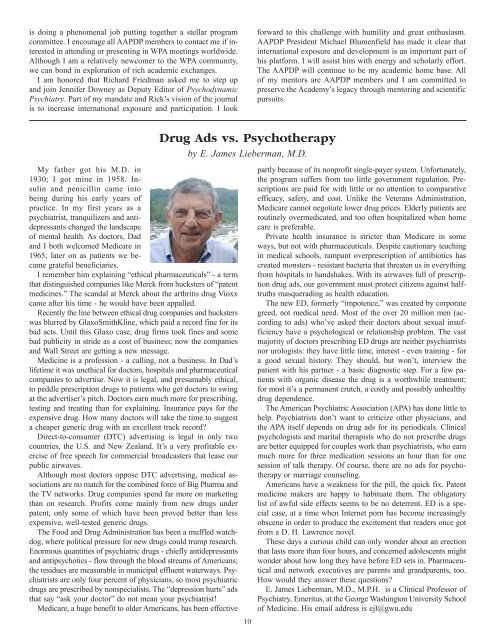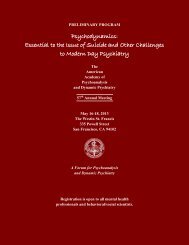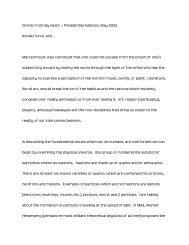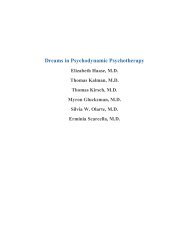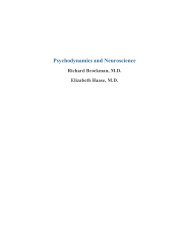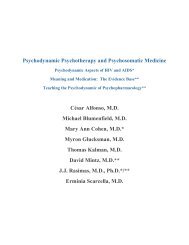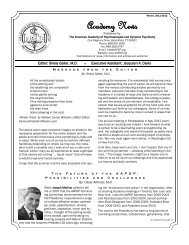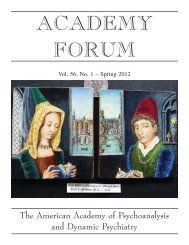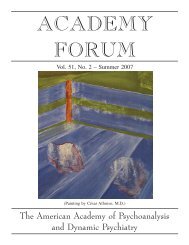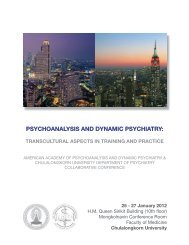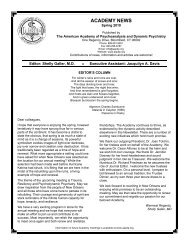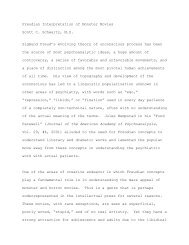ACADEMY FORUM - The American Academy of Psychoanalysis and Dynamic ...
ACADEMY FORUM - The American Academy of Psychoanalysis and Dynamic ...
ACADEMY FORUM - The American Academy of Psychoanalysis and Dynamic ...
Create successful ePaper yourself
Turn your PDF publications into a flip-book with our unique Google optimized e-Paper software.
is doing a phenomenal job putting together a stellar program<br />
committee. I encourage all AAPDP members to contact me if interested<br />
in attending or presenting in WPA meetings worldwide.<br />
Although I am a relatively newcomer to the WPA community,<br />
we can bond in exploration <strong>of</strong> rich academic exchanges.<br />
I am honored that Richard Friedman asked me to step up<br />
<strong>and</strong> join Jennifer Downey as Deputy Editor <strong>of</strong> Psychodynamic<br />
Psychiatry. Part <strong>of</strong> my m<strong>and</strong>ate <strong>and</strong> Rick’s vision <strong>of</strong> the journal<br />
is to increase international exposure <strong>and</strong> participation. I look<br />
forward to this challenge with humility <strong>and</strong> great enthusiasm.<br />
AAPDP President Michael Blumenfield has made it clear that<br />
international exposure <strong>and</strong> development is an important part <strong>of</strong><br />
his platform. I will assist him with energy <strong>and</strong> scholarly effort.<br />
<strong>The</strong> AAPDP will continue to be my academic home base. All<br />
<strong>of</strong> my mentors are AAPDP members <strong>and</strong> I am committed to<br />
preserve the <strong>Academy</strong>’s legacy through mentoring <strong>and</strong> scientific<br />
pursuits.<br />
My father got his M.D. in<br />
1930; I got mine in 1958. Insulin<br />
<strong>and</strong> penicillin came into<br />
being during his early years <strong>of</strong><br />
practice. In my first years as a<br />
psychiatrist, tranquilizers <strong>and</strong> antidepressants<br />
changed the l<strong>and</strong>scape<br />
<strong>of</strong> mental health. As doctors, Dad<br />
<strong>and</strong> I both welcomed Medicare in<br />
1965; later on as patients we became<br />
grateful beneficiaries.<br />
I remember him explaining “ethical pharmaceuticals” - a term<br />
that distinguished companies like Merck from hucksters <strong>of</strong> “patent<br />
medicines.” <strong>The</strong> sc<strong>and</strong>al at Merck about the arthritis drug Vioxx<br />
came after his time - he would have been appalled.<br />
Recently the line between ethical drug companies <strong>and</strong> hucksters<br />
was blurred by GlaxoSmithKline, which paid a record fine for its<br />
bad acts. Until this Glaxo case, drug firms took fines <strong>and</strong> some<br />
bad publicity in stride as a cost <strong>of</strong> business; now the companies<br />
<strong>and</strong> Wall Street are getting a new message.<br />
Medicine is a pr<strong>of</strong>ession - a calling, not a business. In Dad’s<br />
lifetime it was unethical for doctors, hospitals <strong>and</strong> pharmaceutical<br />
companies to advertise. Now it is legal, <strong>and</strong> presumably ethical,<br />
to peddle prescription drugs to patients who get doctors to swing<br />
at the advertiser’s pitch. Doctors earn much more for prescribing,<br />
testing <strong>and</strong> treating than for explaining. Insurance pays for the<br />
expensive drug. How many doctors will take the time to suggest<br />
a cheaper generic drug with an excellent track record<br />
Direct-to-consumer (DTC) advertising is legal in only two<br />
countries, the U.S. <strong>and</strong> New Zeal<strong>and</strong>. It’s a very pr<strong>of</strong>itable exercise<br />
<strong>of</strong> free speech for commercial broadcasters that lease our<br />
public airwaves.<br />
Although most doctors oppose DTC advertising, medical associations<br />
are no match for the combined force <strong>of</strong> Big Pharma <strong>and</strong><br />
the TV networks. Drug companies spend far more on marketing<br />
than on research. Pr<strong>of</strong>its come mainly from new drugs under<br />
patent, only some <strong>of</strong> which have been proved better than less<br />
expensive, well-tested generic drugs.<br />
<strong>The</strong> Food <strong>and</strong> Drug Administration has been a muffled watchdog,<br />
where political pressure for new drugs could trump research.<br />
Enormous quantities <strong>of</strong> psychiatric drugs - chiefly antidepressants<br />
<strong>and</strong> antipsychotics - flow through the blood streams <strong>of</strong> <strong>American</strong>s;<br />
the residues are measurable in municipal effluent waterways. Psychiatrists<br />
are only four percent <strong>of</strong> physicians, so most psychiatric<br />
drugs are prescribed by nonspecialists. <strong>The</strong> “depression hurts” ads<br />
that say “ask your doctor” do not mean your psychiatrist!<br />
Medicare, a huge benefit to older <strong>American</strong>s, has been effective<br />
Drug Ads vs. Psychotherapy<br />
by E. James Lieberman, M.D.<br />
10<br />
partly because <strong>of</strong> its nonpr<strong>of</strong>it single-payer system. Unfortunately,<br />
the program suffers from too little government regulation. Prescriptions<br />
are paid for with little or no attention to comparative<br />
efficacy, safety, <strong>and</strong> cost. Unlike the Veterans Administration,<br />
Medicare cannot negotiate lower drug prices. Elderly patients are<br />
routinely overmedicated, <strong>and</strong> too <strong>of</strong>ten hospitalized when home<br />
care is preferable.<br />
Private health insurance is stricter than Medicare in some<br />
ways, but not with pharmaceuticals. Despite cautionary teaching<br />
in medical schools, rampant overprescription <strong>of</strong> antibiotics has<br />
created monsters - resistant bacteria that threaten us in everything<br />
from hospitals to h<strong>and</strong>shakes. With its airwaves full <strong>of</strong> prescription<br />
drug ads, our government must protect citizens against halftruths<br />
masquerading as health education.<br />
<strong>The</strong> new ED, formerly “impotence,” was created by corporate<br />
greed, not medical need. Most <strong>of</strong> the over 20 million men (according<br />
to ads) who’ve asked their doctors about sexual insufficiency<br />
have a psychological or relationship problem. <strong>The</strong> vast<br />
majority <strong>of</strong> doctors prescribing ED drugs are neither psychiatrists<br />
nor urologists: they have little time, interest - even training - for<br />
a good sexual history. <strong>The</strong>y should, but won’t, interview the<br />
patient with his partner - a basic diagnostic step. For a few patients<br />
with organic disease the drug is a worthwhile treatment;<br />
for most it’s a permanent crutch, a costly <strong>and</strong> possibly unhealthy<br />
drug dependence.<br />
<strong>The</strong> <strong>American</strong> Psychiatric Association (APA) has done little to<br />
help. Psychiatrists don’t want to criticize other physicians, <strong>and</strong><br />
the APA itself depends on drug ads for its periodicals. Clinical<br />
psychologists <strong>and</strong> marital therapists who do not prescribe drugs<br />
are better equipped for couples work than psychiatrists, who earn<br />
much more for three medication sessions an hour than for one<br />
session <strong>of</strong> talk therapy. Of course, there are no ads for psychotherapy<br />
or marriage counseling.<br />
<strong>American</strong>s have a weakness for the pill, the quick fix. Patent<br />
medicine makers are happy to habituate them. <strong>The</strong> obligatory<br />
list <strong>of</strong> awful side effects seems to be no deterrent. ED is a special<br />
case, at a time when Internet porn has become increasingly<br />
obscene in order to produce the excitement that readers once got<br />
from a D. H. Lawrence novel.<br />
<strong>The</strong>se days a curious child can only wonder about an erection<br />
that lasts more than four hours, <strong>and</strong> concerned adolescents might<br />
wonder about how long they have before ED sets in. Pharmaceutical<br />
<strong>and</strong> network executives are parents <strong>and</strong> gr<strong>and</strong>parents, too.<br />
How would they answer these questions<br />
E. James Lieberman, M.D., M.P.H. is a Clinical Pr<strong>of</strong>essor <strong>of</strong><br />
Psychiatry, Emeritus, at the George Washington University School<br />
<strong>of</strong> Medicine. His email address is ejl@gwu.edu


